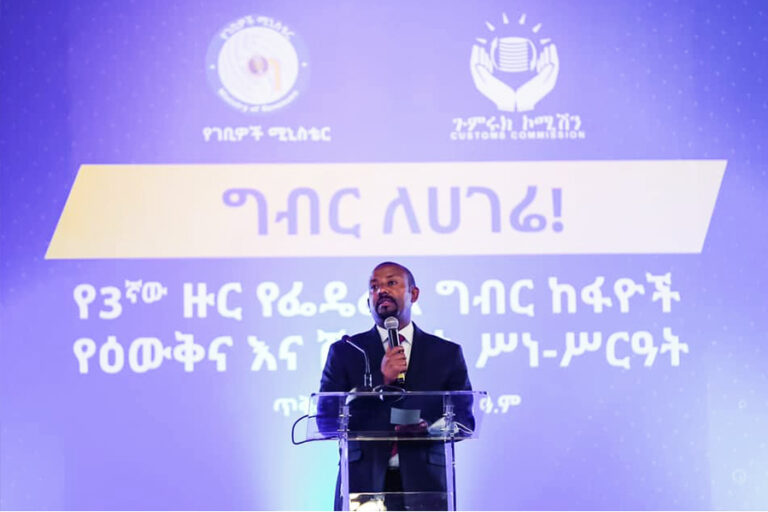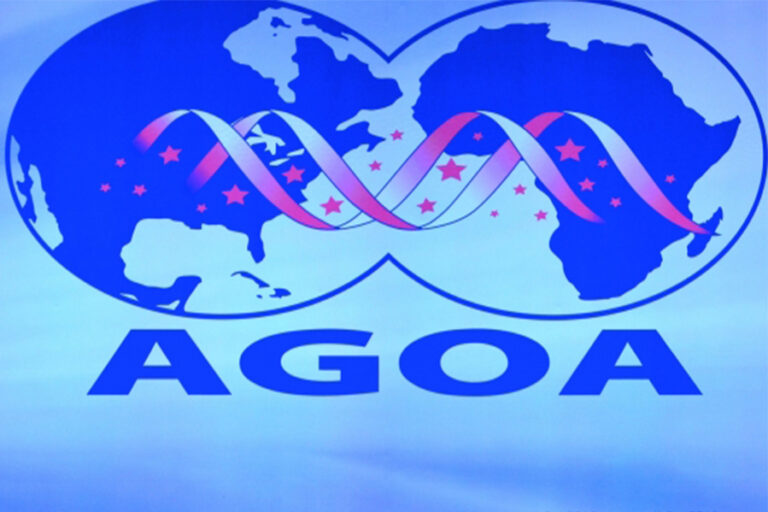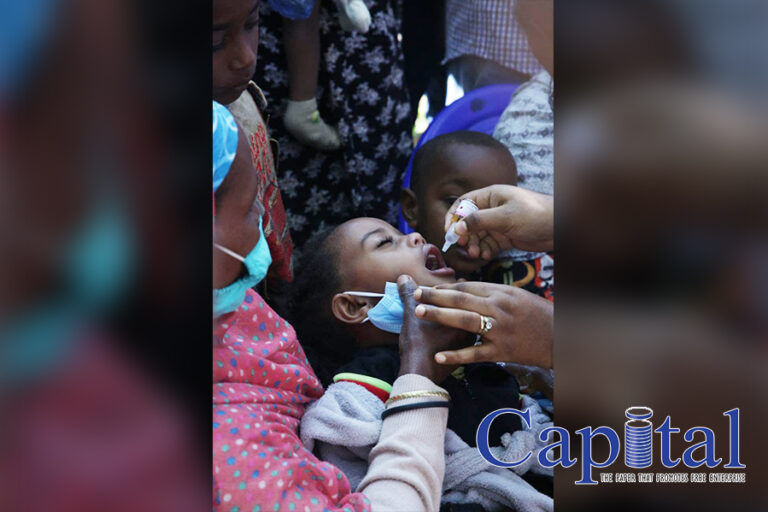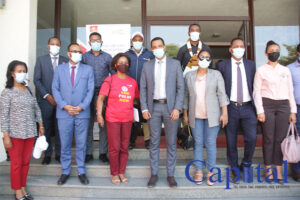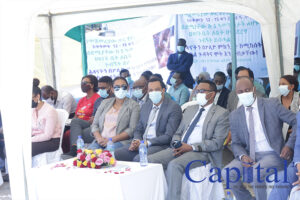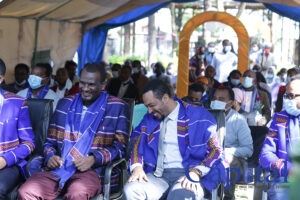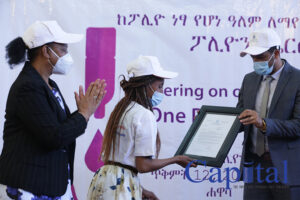Intended to encourage the entire business community to follow the lead in abiding by the law, the third round of federal tax payers’ recognition ceremony was held on Thursday October 21, 2021 at the premises of Unity Park in the presence of Prime Minister Abiy Ahmed.
This year’s program has recognized 300 registered businesses and tax payers that have maintained transparent conduct and paid their taxes in a timely manner.
In this year’s edition the heads of three companies; Arduneja Trading PLC, Herberg plc and Upper Nile Trading were awarded special prize for exposing corruption.
300 timely taxpayers receive recognition
Ordinary Ethiopians to feel the pinch if AGOA is terminated; IPDC, experts warn
Terminating the African Growth and Opportunity Act (AGOA) will directly harm low-income employees especially women than the government says the federal Industrial Park Development Corporation /IPDC/ asking the US to consider its decision beyond politics. Similarly, experts suggested that if the termination turns to become real it could increase unemployment and migration increasing pressure on the government.
Following the conflict in the northern part of the country, the government of America has been saying Ethiopia’s eligibility to the AGOA for the year 2022 will be tabled for discussion if the conflicting parties come up to stop the conflict.
“However the termination could affect low employee ordinary Ethiopians than having direct impact on the political situation,” said Sandukan Debebe CEO of IPDC. “Terminating the platform is like forcing thousands of workers to lose their jobs”, Sandukan said explaining Ethiopia’s eligibility to AGOA and its direct access to the US market to export the aforementioned items, where the Industrial Parks are specialized, have given the country immense competitive advantage to attract global actors in the industries to come and operate within the facilities developed.
As Sandukan said there are parties who want to hurt the country as well as force and mislead the US government to make sanctions on Ethiopia.
“Removing Ethiopia from AGOA has a direct effect of putting all the employees hired by the companies supply products to the export market and ultimately undermining all the successes achieved over the years and also impede the development efforts of the poor,” said the CEO, adding, “We are working in providing information on the impact of the termination as it is against the goal of the ACT.”
Since 2001 when AGOA went into effect Ethiopian eligibility to the AGOA and its direct access to the US market without payment of duties and taxes has contributed significantly to the inflow of capitals into the country in the manufacturing sector mainly in the light manufacturing sectors like the textile and garment, leather and leather products manufacturing sectors that have the potential to easily supply products to the export market and absorb many employments.
“Industrial parks are one of the examples which can show that we are using the platform as it is planned,” said Sandukan. As a flagship project in the country Hawassa industrial park, one of the biggest industrial parks in the country particularly has more than 35,000 workers, of which more than 80 percent of them are less educated women, having 23 companies. According to IPDC the huge exporting market of Hawassa industrial park is US using AGOA, “This could affect their income until they find other proportional markets,” said Sandukan.
As experts believe, if the decision comes up to a termination it could increase unemployment and social crises as industrial parks have created huge employment opportunities for millions both directly and indirectly. As they said this could have negative pressure on the government, increasing unemployment and migration.
Currently, there are 22 industrial parks of which 13 of them are owned and managed by the federal government, 4 integrated agro industrial parks managed by the regional government while 7 are private parks. From the stated 13 federal owned parks, 11 of them are operational. The federal government has, thus far, invested close to 1.5 billion dollar to 13 industrial parks to attract foreign direct investment and attain various macro-economic and social benefits.
From the total 24 Industrial Parks developed in the country, 22 are now in operation and the country has managed to attract more than 250 domestic and foreign investors which till August 2021 created employment opportunities for 86,837 unskilled laborers and more than twenty thousand posts for skilled labor and graduates, excluding the three Industrial Parks in Tigray region which have ceased operations for the last one year.
All the 22 operational Industrial parks now host more than 250 domestic and foreign investors. The two major drivers that attract foreign investors to locate their businesses in Ethiopia are the country’s access to the US market through AGOA and a competitive labor cost, learned from actors in the field.
According to the IPDC inclusive of the ones in the Industrial Park context, currently more than 65 textiles and apparel, and 67 major leather products, and gloves manufacturing industries employ over 200,000 direct jobs which 80 percent of them are women and youth and generate about 230 million dollars per annum.
The life of more than a million low-income citizens relies on textile and leather manufacturing industries, there are hundreds of thousands of farmers supplying cotton and rearing livestock and others involved in the value chain in the supply of various inputs for consumptions of respective industries and export of final products to the export market.
“Both the manufacturing and the textile sectors are highly integrated with the local economy in different ways like catering, service, transportation service, housing, and greenery through auxiliary services provision schemes to the Industrial Parks,” explained Sandukan.
IPDC have, thus far, generated export earnings amounting more than 750 million USD since 2014. Currently out of the 33 direct exporters operating in Industrial Parks specialized on the textile and Garment manufacturers in Ethiopia, 30 enterprise export directly to the USA through the AGOA.
As part of the efforts made to attract FDIs to the country and following the massive inflow of international capital and operators in different business undertakings into Ethiopia, mainly the Ethiopian market entered subsequent to the country’s direct access to the US market, there have been several institutional changes, new departures in the policies and endeavors in establishing institutes for the development of various industrial sectors.
With regards to tariff benefits and general eligibility criteria, AGOA is similar to the Generalized System of Preferences (GSP), a U.S. trade preference program that applies to more than 120 developing countries all over the world. AGOA, however, covers more products and includes additional eligibility criteria beyond those in GSP. Additionally, AGOA includes trade and development provisions beyond its duty-free preferences. AGOA builds on GSP by providing preferential access to the U.S. market for more products, such as apparel, and sets out additional eligibility criteria.
AGOA every year through the president of the USA has the mandate to revise eligible countries which usually took place in September and October. Since its enactment, the U.S government has amended AGOA five times, making some technical changes and renewing the trade preferences. During the submission of the bill for renewal back in 2015, the U.S.A. government asserted that AGOA has been the cornerstone of America’s economic engagement with sub-Saharan Africa over the past fourteen years.
Eligibility for the AGOA trade preference program consists of two separate steps. First, the country must be included in a registry list of sub-Saharan African countries. The second step requires the President of the USA to determine annually which eligible countries, from those on the list, should become beneficiaries of the AGOA preferences following annual reviews.
As it is prescribed under the AGOA legislation, there are two different sets of criteria for the President’s consideration in this process; number of factors related to the potential AGOA beneficiary country’s economy, rule of law, elimination of barriers to U.S. trade and investment, poverty reduction efforts, protection of worker rights, support of terrorist activities, and interference with U.S. national security and foreign policy efforts. Eligibility requirements of the GSP must also be met by any AGOA beneficiary country, including a number of economic and political factors.
Ethiopia launches nationwide vaccination to wipe out Polio
Ethiopia launches a nationwide polio vaccination campaign with the nOPV2 vaccine targeting over 17 million under-five children to help end the circulation of all forms of polio virus.
The campaign was officially launched on October 22, 2021 at Hawassa, Sidama region and will be conducted in all regions of the country on 22-25 October 2021. Vaccinators will move from house to house for this campaign, and will also use temporary fixed sites in camps for internally displaced people (IDP camps) and transit areas.
On their joint statement on Ending Polio, World Health Organization (WHO), UNICEF and ROTARY said, “As we commemorate World Polio Day and launch the nationwide campaign, we reaffirm our unwavering commitment to continue working with the Government of Ethiopia to ensure that every child everywhere is vaccinated to stop the circulation of vaccine-derived polio virus in Ethiopia.”
In 1988, the world committed to eradicate wild polio virus, and today, five out of six WHO regions are certified free of wild polio virus, with wild polio virus reported only from two endemic countries, Afghanistan and Pakistan. Two cases of wild polio virus type 1 were reported globally as of mid-October 2021 compared with 125 for the same period in 2020.
On 25 August 2020, the independent Africa Regional Certification Commission (ARCC) for Polio Eradication officially declared that the WHO African Region that constitutes 47 member states is free of wild poliovirus (WPV). Though 99.9 per cent of polio has been wiped out with the oral polio vaccine, in rare cases when not enough children are reached, other forms of the virus continue to circulate.
The Global Polio Eradication Initiative (GPEI) continues to play a critical role in fighting poliomyelitis worldwide. While the COVID-19 pandemic has put gains on polio eradication and other broader health goals at risk, lessons learnt from years of implementing the polio program will not only help sustain the significant progress made but also contribute to containing the COVID-19 pandemic, and strengthening health systems to withstand similar threats.
“The impressive progress in Ethiopia would not have been possible without the leadership of the Ethiopian Ministry of Health, the commitment of frontline workers and the generous support of polio partners such as the Bill and Melinda Gates Foundation, the US Centers for Disease Control and Prevention (CDC), USAID, CCRDA/CORE Group and other immunizations partners,” said the joint statement.
Betting firm Betika to sponsor Ethiopia Coffee FC
Ethiopian Premier League side Ethiopia Coffee FC have signed a 5 year sponsorship deal with Kenyan betting firm Betika. The deal will see Betika place its logo on the shirt of the players. The deal will also see a payment of 6 million birr per year for Ethiopian Coffee.


